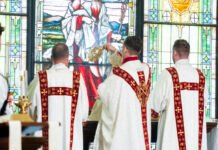The president of the Church of England Evangelical Council, the Rt. Rev. Julian Henderson, Bishop of Blackburn suggested Evangelicals may withdraw from the Church of England if the institution changes teaching on human sexuality. Bishop Henderson’s warning came in the Beautiful Story video produced by the CEEC in response to the Living in Love and Faith project (LLF).
Progressives within the Church of England have sought to amend church teaching on human sexuality, bringing it in line with that of the Episcopal Church of the USA. If this happened, evangelical leaders warned, they would have to consider their allegiance to the Church of England.
Bishop Henderson said in the film: “I’m not sure there are many of us in the Church of England who want to leave the Church of England. Staying in is, I’m sure, the hope and the aspiration of most of us. But, as and when the Church gets to the point where it changes its teaching and its liturgy and its practice in these areas, is going to be a moment for people to have to reconsider their allegiance to the Church.”
“At the moment, I want to be in the Church of England, I want to fight for the traditional teaching of the Church on these matters. But the time may come when it’s going to be essential for those who hold to scriptural teaching on marriage and same-sex relationships to say ‘We cannot operate under this particular system and support this kind of doctrine and practice within the life of our Church.’ And that may then lead to having to look for alternative solutions.”
The Rev Hugh Palmer, rector of All Souls Langham Place in London and chairman of the CEEC said in the video: ““We want to keep the Church of England in standing in the historic truths that it stood on. But if it was to move away from there, then we couldn’t go with that, if it was, say, the blessing of same-sex unions. I know a number of people as they’ve talked through and tried to work out what steps they would have to take realize it would need something really quite radical, even of a provincial nature, to provide an adequate place where people with integrity could remain true to the gospel as they’ve been taught it and understood it.”
The chairman of the Evangelical Group within the Church of England’s General Synod suggested a non-geographical third province, in addition to Canterbury and York, would need to be created for those who could not accept the innovations in doctrine and discipline being proposed. The Rev John Dunnett said in the film: “I guess if we were looking for an ultimate solution, or where this might have to go ultimately, would be to ask questions about provincial arrangement.”
He added: “We might want to say is there any possibility of creating a third or a fourth province and perhaps allocating some of the dioceses differently to the existing or new provinces. No one knows the answer to this, and I’m not offering a solution. I’m simply saying that we may have to have that kind of a conversation in order that we can create safe, sustainable space for these clearly fractured groups across the Church of England as a whole.”
The call for a Third Province for the Church of England arose over twenty years ago in the debates surrounding the ordination of women. Opponents of women clergy asked that a third province be formed to accommodate those who could not accept that innovation. General Synod declined their request.




[…] Read it all. print […]